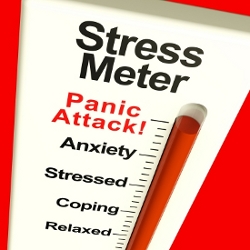Signs of Stress
What are the signs of stress, now that you know what stress is? We talked about how MS is different for everyone. So it is with stress. Your signs will be unique to you.
Stress is something we all experience, but when you’re living with multiple sclerosis (MS), it can feel even more overwhelming. MS already brings its own set of challenges—fatigue, mobility issues, cognitive struggles—and when stress enters the picture, it can make everything feel ten times harder.
The tricky part? Stress doesn’t always look the same for everyone. Just like MS itself, the way stress affects you is unique to you. Some people feel it physically, while others experience it emotionally or mentally. Understanding the signs of stress can help you recognize when it’s creeping in and take steps to manage it before it takes a toll on your health.
Physical Signs of Stress
Stress isn’t just something that happens in your mind—it shows up in your body, too. When you feel threatened or overwhelmed, your body reacts by releasing stress hormones like cortisol and adrenaline. These hormones prepare you to deal with the situation, but if stress becomes chronic, they can start to wear you down.
Here are some common physical signs of stress:
- Sweaty palms – Your body’s way of preparing for action.
- Dry mouth – Stress can reduce saliva production, making your mouth feel parched.
- Pounding heart – Your heart rate increases as your body gears up for a fight-or-flight response.
- Queasy stomach – Stress can trigger digestive issues, leading to nausea or stomach discomfort.
- Tension headaches – Muscle tightness in your neck and shoulders can lead to headaches.
- Feeling drained – Stress can sap your energy, making you feel exhausted even if you haven’t done much.
For those with MS, feeling drained can be especially confusing. MS-related fatigue is already a challenge, so how do you tell the difference between stress exhaustion and MS fatigue? One clue is timing—if you’ve just gone through a stressful event, your exhaustion is likely stress-related.
Another thing to consider is medications. Some MS treatments can cause side effects that mimic stress symptoms. If you’ve recently started a new medication, check the information that came with it—you might find that some of your symptoms are medication-related rather than stress-induced.
How Stress Can Trigger MS Symptoms
One frustrating thing about stress is that it can worsen MS symptoms. You might notice:
- Increased numbness and tingling
- Blurred vision
- Muscle weakness or spasms
The good news? Once the stressful event passes and you calm down, these symptoms often fade. But if stress is constant, it can keep your body in a state of tension, making MS symptoms feel more intense than usual.
Emotional Signs of Stress
Stress doesn’t just affect your body—it impacts your mind and emotions, too. When you’re under pressure, your brain reacts just like your body does, triggering feelings that can be hard to shake.
Here are some common emotional signs of stress:
- Anxiety – Feeling restless, nervous, or constantly on edge.
- Irritability – Getting frustrated easily, even over small things.
- Pessimism – Feeling like everything is going wrong or expecting the worst.
- Overwhelm – Struggling to handle daily tasks or feeling like you’re drowning in responsibilities.
- Sadness – Feeling down or emotionally drained.
Do you find yourself snapping at people more than usual? Do you feel like nothing is going right? Are you having nightmares or feeling constantly on edge? These could all be signs that stress is taking a toll on your mental health.
Stress vs. Depression:
How to Tell the Difference
Stress and depression can look similar, but there’s one key difference—duration. Stress-related sadness or anxiety usually comes and goes, depending on what’s happening in your life. Depression, on the other hand, sticks around for weeks or months.
If you’ve been feeling down for more than a few weeks, it’s worth talking to your doctor. Depression is manageable, and getting support can make a huge difference.
Identifying Your Stress Triggers
One of the best ways to manage stress is to figure out what’s causing it. Everyone has different stress triggers, but some common ones include:
- Health worries – MS symptoms can be unpredictable, leading to anxiety about the future.
- Financial concerns – Medical bills, work limitations, and disability benefits can add stress.
- Relationships – Feeling misunderstood or unsupported by family and friends.
- Daily responsibilities – Balancing work, household tasks, and self-care.
Once you identify your triggers, you can start working on ways to reduce stress.
Managing Stress When You Have MS
Stress is unavoidable, but there are ways to keep it from taking over your life. Here are some strategies to help you manage stress effectively:
1. Practice Relaxation Techniques
Deep breathing, meditation, and mindfulness can help calm your nervous system and reduce stress. Even five minutes a day can make a difference.
2. Stay Active
Exercise releases endorphins, which help counteract stress hormones. If mobility is a challenge, try gentle stretching, yoga, or short walks.
3. Set Boundaries
If certain situations or people drain your energy, it’s okay to say no or take a step back. Protecting your mental health is just as important as managing MS symptoms.
4. Connect with Others
Talking to people who understand what you’re going through can be incredibly helpful. Whether it’s friends, family, or an MS support group, having a strong support system can ease stress.
5. Prioritize Self-Care
Make time for things that bring you joy—whether it’s reading, listening to music, or spending time outdoors. Self-care isn’t selfish—it’s necessary.
Some Final Thoughts
Stress is a part of life, but when you have MS, it can feel even more overwhelming. The key is to recognize the signs, identify your triggers, and find ways to manage stress before it takes a toll on your health.
You are stronger than stress, and you have the power to take control of how it affects you. If you ever feel like stress is too much to handle alone, don’t hesitate to reach out for support—whether it’s from a doctor, therapist, or loved one.
You’ve got this.
Here is an article by National MS Society about signs of stress and multiple sclerosis. (Link will open in a new window).
Dear Friends,
"Life in Spite of MS is a participant in the Amazon Services LLC Associates Program, an affiliate advertising program designed to provide a means for sites to earn advertising fees by advertising and linking to Amazon.com. We're also part of the Ebay Partner Network, another affiliate program."
We'd also like you to know it doesn't cost one cent more when you click through the links here on our blog. Not one single penny. And we will make a little extra cash when you do click through. We'll be ever so appreciative. You also have our word that we'll only link to things that we would use ourselves, (or wish we could have or use).
Sincerely,
Cir & Akrista
You are reading original content written by Akrista or Cir L'Bert of Life in Spite of MS. If you enjoyed reading this blog, please consider following us on Facebook, Twitter, Pinterest, and Instagram. See you there!
Privacy Policy ~ Advertising Policy ~ Disclaimer ~ Contact Us ~ About Us





New! Comments
Have your say about what you just read! Leave me a comment in the box below.